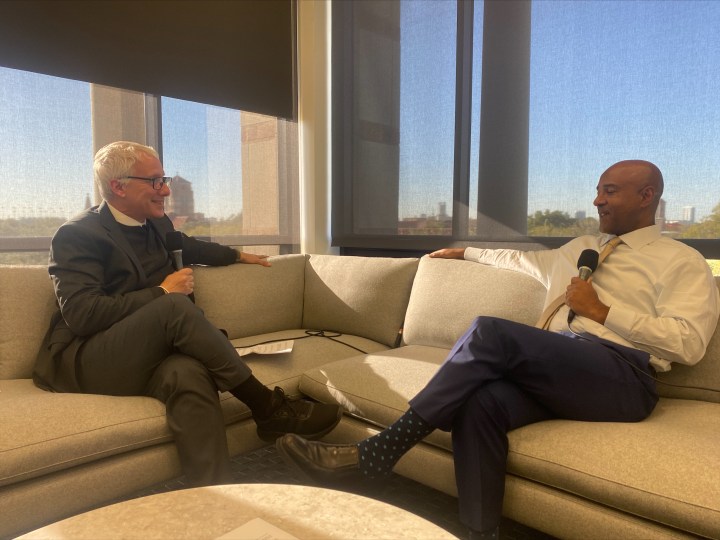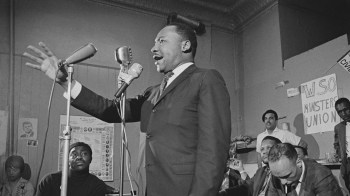
How colleges can adapt to a shape-shifting economy, with Rice University’s new president
How colleges can adapt to a shape-shifting economy, with Rice University’s new president

In a time of inflation, high job availability and talks of a looming recession, some may be rethinking the decision to invest in a college degree. Over the course of 2022, college enrollment declined for a second consecutive year since the beginning of the pandemic, although the decline wasn’t nearly as sharp as in 2021.
However, at Rice University in Houston, Texas, applications are still flowing in at an incredible rate. “Our enrollments are robust, we receive something like 33,000 applicants for a class of 1,200…so we’re not seeing that pressure,” said Rice University President Reginald DesRoches, who took the helm of the school in July.
While the generally high cost of college might be a deterrent for students and parents alike, DesRoches said that the school has financial aid options like “The Rice Investment” available to lessen the burden. The new president also detailed a new vision for inclusion at the university, saying that leadership needs to come from the top down.
The following is an edited transcript of an interview between DesRoches and Marketplace’s David Brancaccio for our ongoing Economic Pulse series:
David Brancaccio: First it was — for higher ed — COVID then a strong job market. College enrollment nationally, even now with the competition of this roaring job market, enrollment nationally is much lower than it was before pandemic. Are you feeling increased competition for fewer students at this institution?
Reginald DesRoches: No so much. I mean, our enrollments are robust, we receive something like 33,000 applicants for a class of 1,200. So we’re not seeing that pressure. Obviously, COVID has just impacted all universities, including Rice in many ways in terms of how we continue to deliver our mission while maintaining members of our community safe and healthy. And I think we’re all dealing with that. Fortunately, we’re good on enrollments, Rice is a very well-sought-after university, we’re very fortunate from that perspective. We’re seeing challenges in terms of recruiting talent — staff, and faculty — and then the changing workforce impacts us also because we’re in the city of Houston, where we’re competing for talent with everybody, not just other universities, but all these major companies. So it’s a challenge for us, too.
Brancaccio: You know, at first, I think of staff, but also, I mean, if you have an academic with an expertise, let’s say in computer engineering, there might be a job somewhere else, too.
DesRoches: Oh, yeah, we’re seeing that increasingly, we’re competing with industry for certain talent, faculty talent, particularly in computing and data science. But then on the staff side, we’re competing with everybody and the changing landscape in terms of telework and flexibility. We have to be able to adapt to be able to maintain the talent and recruit talent to the university.
Brancaccio: It’s become, I think, increasingly accepted in, I don’t know, polite company to say that a college education isn’t the right choice for everyone. In fact, that’s the line from the Senate debate in Pennsylvania this week, one of the candidates said those words. Given the costs of education for students, what are your thoughts on this notion of, “It’s not right for everyone,” or thought of differently, “What is the case for, in fact, spending the money to get that education?”
DesRoches: No, it’s certainly not the case for everybody to get to spend the money. We’re very fortunate in that we really believe at Rice that if you have the aptitude, and the desire to study at a place like Rice, we have a very aggressive financial aid package to allow you to come to a place like Rice. Not everybody has to come to Rice, there are many other opportunities, including community college, and we work closely with community colleges to find mechanisms for them to go and come to a four-year institution, whether it’s Rice or one of the other ones. We’re very proud of our financial aid, The Rice Investment, which really provides financial aid for students who want to study at Rice who may not have the means to study.
Brancaccio: Parents are asking tougher questions, though, about the costs. I know that students are as well. I mean, I know that you’ve been thinking about the case, you know, for considering higher ed and that investment. Share with us some of your thoughts on that.
DesRoches: Yeah, I mean, the ROI is something that increasingly parents are looking at. And so we want to make sure that we’re providing the type of education where students, when they leave this university, they’ll get a good job. And we’re really proud [that] we’ve placed students in great companies, we have a really high placement rate, in jobs or in graduate school, many of our students end up going to graduate school. Not only do we provide the type of education to prepare them, but we really focus on things we do outside the classroom that can prepare our students — whether it’s a leadership program, the Doerr Institute for New Leaders, or other things that really prepare the students to go out and work knowing that in five years, what they’re doing now will be very different. So they need to get the type of education that will prepare them to adapt and change over their careers. And I think we do that well.
Brancaccio: We have reported on the following survey: right now 91% of CEOs think there’s going to be a recession next year. And of those only a third think it’s going to be a mild one. That means like about two-thirds, it’s something other than mild. Are you battening down the hatches for that? I mean, in a sense, it’s an opportunity if the economy at large, is starting to shed jobs, maybe it’ll make it easier to run an institution of higher learning. But on the other hand, you may have parents and students that find it harder to pay the freight.
DesRoches: Sure. No, that’s certainly the case. So what I think what we found is that at most universities, particularly at the graduate level, when the job market gets tight, people come to graduate school, you know, MBA or other things. And so from that perspective, we may see some increases in that versus when the economy is really good, and people rather stay in their jobs. So we don’t see it at the graduate level. At the undergraduate level, we’ll have to see what happens if there is a major recession like many people are predicting.
Brancaccio: As provost, I think it was, you established the university’s Office of Diversity, Equity, and Inclusion. What did you learn from that process that might be useful for other organizations engaging these issues — other organizations working for real change?
DesRoches: So a couple of things. It has to come from the top in many ways. It has to be part of the culture, right, so we created this office, we put a new leader in there, it has to be part of the university’s culture. The other thing I would say it’s not just about the numbers, right? It’s not just about being diverse and having X percent of students or X percent of faculty or graduate students. It’s about having a sense of being inclusive, students feeling like they belong there. And part of that is making sure they have people in the classroom that look like them. So one of the things we really focused on, in addition to having diverse students at the graduate and undergraduate level, is trying to diversify the faculty, which is one of the biggest challenges many universities have. But boy, when students see people in the classroom that look like them, it has a huge impact on persistence and their sense of belonging at the university. And we’ve done well, we’ve done with a number of African American faculty, for example, in the five years I’ve been here. So you can do that if you’re intentional about and really work at the department level, you work at all levels to make sure that people know it’s just part of what we do as a university.
Brancaccio: And you made the point that they have to see this leadership from the top.
DesRoches: Absolutely.
Brancaccio: Alright. So in other organizations thinking about that, try to do that. But boy, I mean, in academia, any kind of change is complex, and all those departments that you have. But it seems like you were able to figure out a way to get buy-in.
DesRoches: We were, we really were. We worked, obviously, from the top in terms of the President’s office and the Vice Provost for Diversity, Equity, and Inclusion. But we really worked at the department level, and each department really saw this as something that they had to do.
Brancaccio: Was there money for it?
DesRoches: There was some, absolutely, we have incentives for it. You have to align your incentives with your priorities. And it’s something we also did.
Brancaccio: You’re an engineer and I have an engineering talent question. I was sitting with a prominent tech CEO based in Houston this week. He moved his headquarters, a big firm, to this area because of the talent coming out of the universities in the region. He said — he mentioned — Rice, among others. What can you do, a private elite university, to help people from more diverse backgrounds get access to some of these tech jobs that seem to be on offer?
DesRoches: Yeah, obviously continue to diversify our own student body, which we’re doing at the undergraduate and the graduate level, but also partner with other institutions. So we’ve partnered with, we’re partnering with HBCUs here, we’re very fortunate to be in the most diverse city in the US. We like to say that in Houston. But we’re having partnerships with TSU, with Prairie View, we have partnerships outside of the city also with Spelman, for example. We have a program where you can do three years there and then transfer to Rice in two years and get two degrees. So having partnerships with universities in your city and U of H of course.
Brancaccio: University of Houston?
DesRoches: Yes, which is a Hispanic-serving institution, right down the street. So having these partnerships is absolutely critical for success in terms of improving the diverse talent, particularly in the STEM fields.
There’s a lot happening in the world. Through it all, Marketplace is here for you.
You rely on Marketplace to break down the world’s events and tell you how it affects you in a fact-based, approachable way. We rely on your financial support to keep making that possible.
Your donation today powers the independent journalism that you rely on. For just $5/month, you can help sustain Marketplace so we can keep reporting on the things that matter to you.


















